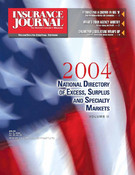The 2004 session of the Oklahoma legislature was unusual. It was marked by disappointment of missing an opportunity to address much needed reforms in tort and workers’ compensation issues and triumph regarding passage of regulatory reform and repeal of loss control programs. A cloud of controversy served as the backdrop for a session where the Department of Insurance (DOI) was virtually invisible due to the investigation, subsequent indictment and continuing legislative committee impeachment investigation of Insurance Commissioner Carroll Fisher.
The following measures passed this session:
Civil Justice Reform and Regulatory Reform: In a unique situation, the stalemate over large-scale tort reform created an opportunity to negotiate directly with the trial bar on several issues of interest to both parties. In the main, HB 2470:
• Adopts the NCOIL Model Property and Casualty Competitive Loss Cost Rating Act;
• Reinstates the “owned but not insured” exclusion, insuring that free insurance coverage is not provided for uninsured household owned vehicles;
• Allows Oklahoma domestic insurers and others to utilize Declaratory Judgment actions to resolve insurance coverage disputes, eliminating the existing law, which discriminates against domestic insurers;
• Creates an exception to the hearsay rule for medical reports on cases where the claim is under $25,000;
• Allows additional individuals and entities to bid at salvage auctions and increases opportunity for out of state and foreign buyers to buy online at Oklahoma insurance pool auto auctions:
• Adopts Rule 26 of the Federal Rules of Civil Procedure for state actions regarding discoverability of insurance limits; and
• Increases Financial Responsibility Limits from 10/20/10 to limits of 25/50/25.
Loss Control: HB 2140 repealed the Oklahoma High Hazard Workers’ Compensation Act. The bill resulted from negotiations with the Department of Labor, which finally agreed to support the repeal of this costly and burdensome program.
Tort Reform: In 2003, a non-economic damage cap was enacted for certain specialties and hospitals, but fell short of achieving the level of reform needed to restrain the cost drivers of medical malpractice and other liability coverage. HB 2661, supported by Gov. Henry, is the result of a session long negotiation process between the business community, physicians and the trial bar. In the final bill, the physicians sold out to the trial bar for little or no reform in order to salvage their mutual malpractice carrier.
Property: HB 2324 restricts the use of a non-claim inquiry for underwriting purposes but establishes an inquiry may not be used until the policyholder actually files a claim. Similar language is also contained in HB 2668 pertaining to motor vehicle insurance.
Auto: Under HB 2668, in its approved version:
• No insurance carrier who issues motor vehicle insurance policies in Oklahoma may without actuarial justification cancel, refuse to issue or renew, or charge a higher premium for any motor vehicle liability or collision insurance policy because the insured had lower liability limits with a previous insurer. This prohibition includes using prior limits for company or tier placement unless the insurer provides actuarial justification.
• Every motor vehicle liability insurance policy approved by the insurance commissioner shall include a provision providing that the financial responsibility limits of another state or province shall be met if so required by the other state and if the financial responsibility limits of the other state or province are higher than those required by the state where the motor vehicle is principally garaged. Language that is substantially similar to the provision/wording shown above shall be considered to be in compliance with the law.
• No insurer that issues any type of P/C insurance policy in Oklahoma shall increase premium rates, cancel a policy, or refuse to issue or renew a policy solely on the basis of a policyholder inquiring about making a claim or requesting information about a possible claim, as long as the policyholder does not in fact submit a claim.
The Comprehensive Workers’ Compensation Reform Act, SB 559, failed to receive a hearing in the Senate. A coalition of large employers and insurers, Oklahomans for Jobs Now, funded a hard hitting advertising campaign as well as a focused grassroots effort, but in the end the governor and Senate president refused to allow the bill to be heard in Senate committee. The House version (HB 1629) passed the House but failed to receive a hearing in the Senate.
Tiffany O’Shea is the Public Affairs director, Southwest Region, for the American Insurance Association.
Was this article valuable?
Here are more articles you may enjoy.


 CFC Owners Said to Tap Banks for Sale, IPO of £5 Billion Insurer
CFC Owners Said to Tap Banks for Sale, IPO of £5 Billion Insurer  Florida Regulators Crack the Whip on Auto Warranty Firm, Fake Certificates of Insurance
Florida Regulators Crack the Whip on Auto Warranty Firm, Fake Certificates of Insurance  State Farm Adjuster’s Opinion Does Not Override Policy Exclusion in MS Sewage Backup
State Farm Adjuster’s Opinion Does Not Override Policy Exclusion in MS Sewage Backup  Former Broker, Co-Defendant Sentenced to 20 Years in Fraudulent ACA Sign-Ups
Former Broker, Co-Defendant Sentenced to 20 Years in Fraudulent ACA Sign-Ups 


